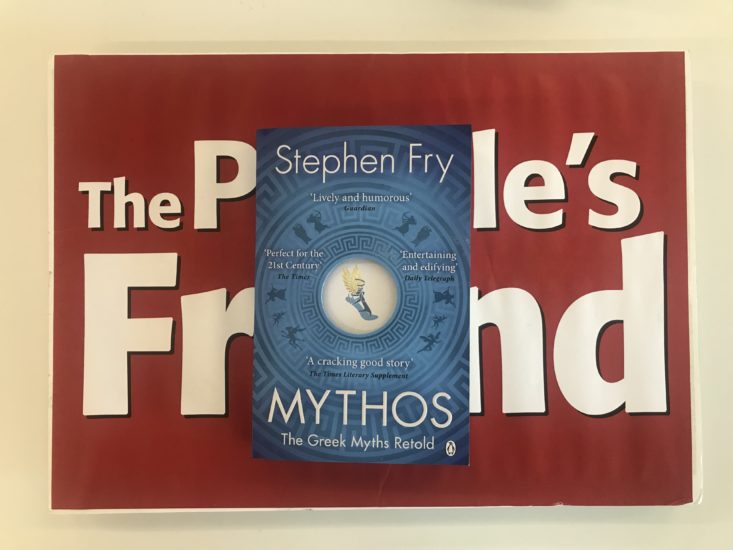
As the Edinburgh International Festival drew to a close, Mrs Digital Ed and I were very excited to sit down for a story from Stephen Fry.
We weren’t alone, of course; the author, presenter and actor was performing in front of a sell-out crowd at the town’s Festival Theatre.
His one-man show, “Mythos: Heroes”, was adapted from his best-selling book of the same name. And, undoubtedly like the book, it was a storytelling tour de force.
Sitting in a cosy armchair in front of a row of big screens that leapt into life to illustrate his points, Stephen took to re-telling the myths of the great Greek heroes.

My copy of “Mythos”. Photograph by Iain McDonald.
Some of the tales were familiar, like Heracles (or Hercules) and his labours, or Perseus and Medusa. Some of them were less familiar. But all were utterly fascinating, and told with a captivating flair for the dramatic — and plenty of humour.
The power of a good story(teller)
The most astonishing thing about the show wasn’t the tales of gods and men. It was the storyteller.
Stephen Fry held court for nearly 2.5 hours. He had the bare minimum of assistance from computer graphics, and occasionally invited audience participation.
And it all seemed so effortless, rarely if ever mispronouncing the increasingly complex Greek names, and never losing his grip on the narrative.
Watching it made me think about all the great advice our Fiction team gives to aspiring (and current) “Friend” contributors.
Our advice
From considering what writers can learn from the theatre to pointers for casting real people in your fiction; from tips on story setting and memorable opening lines, they really go out of their way to make sure writers have the best tools at their disposal.
The Grammar Guru is here to help writers avoid common pitfalls in their work, and there are even frequent glances behind the scenes, offering reassurance to those worried their story hasn’t been published yet, or insights into the magazine’s requirements for serials or pocket novels.
It’s unclear if Stephen Fry had support like this when he was writing “Mythos”, or constructing his show, but one thing is certain: taking advantage of it will definitely improve your next submission to “The People’s Friend”.
Keep an eye out for a book review on this coming soon!




